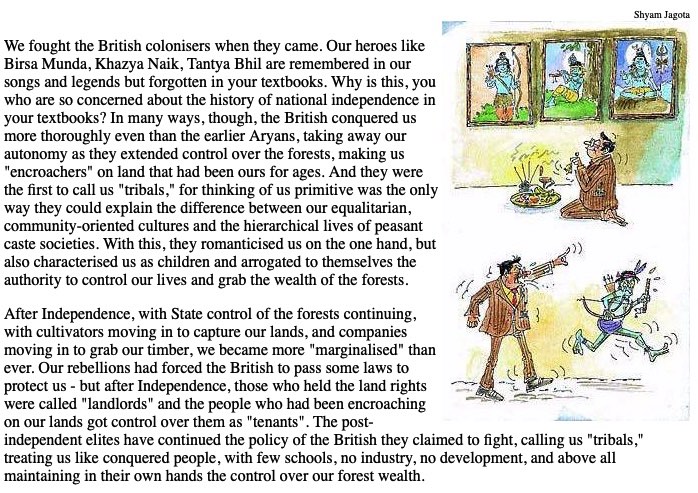
This guide looks beyond the exotic images tracing the story of different indigenous people from their first contact with explorers and colonizers to the present day. Much of this story is told by the indigenous people themselves and they present the issues behind the challenge to give them their own space in their own lands
About the author: Lotte Hughes is a freelance journalist and historian, with a particular interest in the Maasai of east Africa and oral history. She has written about development and human rights issues for newspapers and NGOs and won the John Morgan Writing Award. Format: ePub Publication date: March 2012 ISBN-13: 978-1-78026-073-0
Source: Indigenous Peoples (e book) — New Internationalist
Address: https://ethicalshop.org/ebook-no-nonsense-guide-to-indigenous-peoples.html
Date Visited: 16 July 2021
Find publications by reputed authors (add “open access” for freely downloadable content)
PDF-repository: texts quoted & further reference (Google Drive) >>

“We have to write our own stories, about our issues, from our own perspectives” – Abhay Xaxa >>
In recent years, the results of any new research on early India have invited keen political interest, because proponents of Hindu nationalism support the notion of Vedic culture – including the Sanskrit language, a pastoral economy dependent on cattle, and the origins of a caste hierarchy – as fundamental to the origins of Indian civilisation.
But the [Indus Valley Civilisation] is a pre-Vedic culture. A long, contentious debate on whether Vedic culture originated in what is now Indian territory or was the result of complex patterns of migration and settlements has, so far, thrown up little evidence of the former. The Keeladi excavations further challenge the idea of a single fountainhead of Indian life. They indicate the possibility that the earliest identity that can recognisably be considered ‘Indian’ might not have originated in North India. […]
When the ASI team began to dig around the central part of the mound at Keeladi, they found the site was once an Iron Age settlement that evolved and continued into the historic period. The first three metres from the top revealed brick structures from the early historic phase, and 1.5 metres below that was evidence from the Iron Age, where a large number of axes, daggers, spades, knives and forceps were found. […]
Source: “The Dig” by Sowmiya Ashok (Fiftytwo.in, 2 April 2021)
Address: https://fiftytwo.in/story/the-dig/
Date Visited: 16 July 2021
“The issue is not whether the world’s economy is governable toward ambitious goals like promoting social justice, equality between countries and greater democratic control for the bulk of the world’s people, but whether it is governable at all.” – Mogobe B. Ramose quoting Globalization in question by Hirst, P. and Thompson, G in “Globalization and ubuntu” (The African Philosophy Reader), pp. 732 | Globalization >>
[Bold typeface added above for emphasis]

See also
Education and literacy | Right to education
Freedom of the press | World Press Freedom Index
Journalism | Find press reports on India’s tribal heritage and democracy: Journalism without Fear or Favour, The Committee to Protect Journalists & United Nations
People’s Archive of Rural India (PARI)
Proper coverage of “deprivation”: Ethical considerations for students of Indian journalism
Recovering tribal culture from the misrepresentation of mainstream media